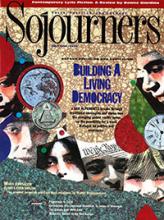FOR MOST OF THE 20TH CENTURY, the progressive vision of the future has in one form or another revolved around the socialist idea that equality and democracy can best be achieved by a system in which ownership of society's wealth ("the means of production") is vested in a structure beholden to, and controlled by, society. In practice, for the most part, this structure has been the state.
The crisis in Eastern European and Soviet socialism confronts progressives throughout the world with a fundamental challenge: What happens if the traditional socialist ideal collapses, particularly if socialism's "distant cousin" -- the liberal welfare state -- also loses its capacity to achieve fundamental value goals?
It is well to begin with an honest acknowledgment: In criticizing the socialist idea, thoughtful conservatives (as opposed to demagogues and self-serving right-wing politicians) have for more than a century argued that vesting both economic and political power in one institutional structure must inevitably lead to the destruction of individual rights, democracy, and the human spirit. They have applied a similar critique to the expansive welfare state. Freidrich Hayek, whose book The Road to Serfdom became a conservative bible, pushed the argument well beyond narrow economic ideas:
Read the Full Article

